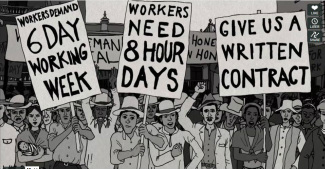 Columbian banana workers demand basic labor rights. Columbian banana workers demand basic labor rights. Tags: capitalism, class, economic sociology, government/the state, historical sociology, inequality, organizations/occupations/work, political economy, social mvmts/social change/resistance, theory, violence, war/military, ideology, labor, neocolonialism, postcolonialism, postcolonial theory, propaganda, 00 to 05 mins Year: 2013 Length: 2:43 Access: Vimeo Summary: This animated excerpt comes from the documentary, "Banana Land: Blood, Bullets and Poison." The clip recounts the events of December 6, 1928, when Colombian workers gathered to the protest the conditions of their employment under the United Fruit Company (UFC), which is now known as Chiquita. As the film explains, by the early twentieth century UFC had become a powerful multinational corporation, and in exchange for its role in helping to prop up repressive regimes in Latin America, the company was afforded cheap land, and in time, it came to develop a monopoly on the transport of fruit in the region. When workers organized to demand better working conditions, including 6-day work weeks, 8-hour work days, money instead of scrip, and written contracts, they were met with a violent response from the Colombian military. Protecting the interests of American economic elites, the United States government threatened to invade Colombia in order to quell the UFC worker protests, and in response, the Colombian government dispatched a regiment from its own army to do the job. The Colombian troops effectively created a kill box, setting their machine guns on the roofs surrounding the plaza where a group of protestors had gathered. After a five-minute warning to disperse, the troops opened fire killing women, men, and children. Other than a sobering reminder of the power corporations often wield over the lives of workers, especially when they have the backing of states, this clip would work well as a means of introducing some of the basic components of postcolonial theory, which can be understood as a body of thought that critiques and aims to transcend the structures supportive of Western colonialism and its legacies. In contrast to Marxist dependency theories and the world systems perspective, work in the postcolonial tradition tends to emphasize cultural, ideological, and even psychological structures born from the forceful and global expansions and occupations of Western empires (Go 2012). The banana strike and its violent conclusion is a vivid example of the way the United States has maintained a postcolonial grip on the running of foreign economies. In this case, a propaganda machine chipped away at international sympathy for the protesting workers, while at the same time, the U.S. was able to wield power over the Colombian government by mere threat of military force. Submitted By: Lester Andrist
4 Comments
Manuel Franco
7/29/2023 02:03:27 am
I just want to say Thank You to everyone who supported me through the years. My name is Manuel Franco, New Berlin, Wisconsin. My story of how I won the Powerball lottery of $768.4M is a bit of a tale. I have been playing Powerball tickets for 6 years now since I turned 18. I bought my first ticket on my 18 birthday. I was feeling very lucky that day because I had contacted Dr. Odunga Michael to help me with the winning Powerball numbers. I really had that great great feeling that I looked at the camera wanting to wink at it. I only did a tiny part of it and trusted him. He gave me the numbers after I played a couple other tickets along with it for $10. I checked my ticket after the winnings came online and saw the numbers were correct including the Power play. I screamed for about 10 minutes because it felt like a dream. I had won $768.4M. You can check my winning testimony with the lottery officials just with my name search. Thank you Dr Odunga. Well, his email is [email protected] and you can also call or Whats-app him at +2348167159012 so you guys can contact him
Reply
mark hold
7/7/2024 03:08:33 pm
One faithful day as i was watching a video on you tube i saw a comment of one MR PAUL HAVERSACK testifying of this great herbal healer doctor Moses Buba,That helped him enlarge his manhood .i was shocked and happy, so i quickly visited his website and emailed him within 30 mins he got back to me and told me all i need to buy and i did so after 4 days i received his herbal medicine ,he gave me instructions on how to use it ,as i am speaking to you people now after using the cream for just two weeks my manhood size is 10 inches long and 8.0 girth ,,am so happy and grateful for his work in my life thank you so much Doctor Moses buba ,,i also learnt he has cure for LOW SPERM COUNT,PREMATURE EJACULATION,ERECTILE DYSFUNCTION,HIV/AIDS VIRUS,DIABETES 1/2,HERPES DISEASE,CANCER,and lots more
Reply
Leave a Reply. |
Tags
All
.
Got any videos?
Are you finding useful videos for your classes? Do you have good videos you use in your own classes? Please consider submitting your videos here and helping us build our database!
|
 RSS Feed
RSS Feed
